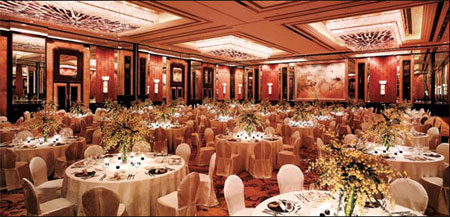Hotels, event planners look to meetings to boost revenue
|
Ballroom with a Western dinner setup at the Shangri-La Hotel Guangzhou. Photos Provided to China Daily |
Event planners, tourism and convention bureaus and hotels worldwide are pinning their hopes on the huge potential of China's MICE market amid the slow recovery of the world economy, sources said.
The MICE industry refers to meetings, incentives, conferences and exhibitions. It is a type of tourism in which large groups are brought together for a particular purpose.
China is expected to surpass the United States to become the world's largest business travel market by 2015, and the sector will see 15.2 percent year-on-year growth in 2013, according to the Global Business Travel Association.
The number of meetings in Beijing last year gave a glimpse of how large the market is. "The city hosted 180,000 meetings in 2012, here only referring to those with paid venues, excluding all kinds of internal office meetings," Zhang Yongshun, an official with Beijing Bureau of Statistics told China Daily.
The central government directive specifically forbade public institutions from hosting unnecessary and expensive banquets and conventions.
In response to the government's anti-extravagance campaign, industry players including hotels are readjusting their banquet sales strategy to adapt to the changing market to lure more corporate and private-oriented meetings and events in their magnificent ballrooms.
Statistics from Horwath HTL China show that the average occupancy of top hotels was 55 percent in Shanghai, 60 percent in Beijing and Guangzhou, and 65 percent in Shenzhen in the first five months. Room rates also fell in most cities from January to May compared to the same period last year, according to the data.
Another major source of hotel revenue, MICE has also suffered to some extent, but it mainly results from a decline in the number of meetings and conventions hosted by government and public institutions, said Wu Shaoyuan, executive vice-president of the Alliance of China Conference Hotels.
"Such meetings account for about 30 percent of the total in my survey of 25,600 meetings and conventions in the country in 2012, while meetings by companies and non-profit organizations, which combined account for almost 70 percent, have seen little impact," Wu said.
"It is essential for companies to have meetings if they want to see new developments, so they won't be affected by the government's anti-extravagance campaign." He suggested that hotels should encourage their MICE departments to focus on companies instead of the government.
He added that there is still room for development because corporate meetings account for about 80 percent of business at hotels abroad. Meetings in China generated estimated revenue totaling at least 1 trillion yuan ($163 billion) in 2012.
He said conference hotels host more than 70 percent of such meetings, with conference centers, resorts and training centers combined accounting for the rest.
"In some sense, the competition is mainly within the hospitality industry," he said
However, industry insiders said the "hardware" is just one consideration in their decision-making process.
What really matters is a hotels' service team, TTG China quoted Zhao Shaohui, head of CTS MICE Service Co Ltd's business event department, as saying.
"Even after meetings are scheduled, the details are changing all the time. So what concerns us most is whether the service team can respond quickly to meet our new demands and ensure smooth meetings," Zhao said.
"International brands are doing a better job than Chinese hotels in this aspect." Zhao said the location of hotels will also be factored into decisions MICE companies make about where to host events.
"If hotels are located in the city's business districts, they will have a better chance," he said.
Contact the writers at liuweifeng@chinadaily.com.cn and lifusheng@chinadaily.com.cn



















